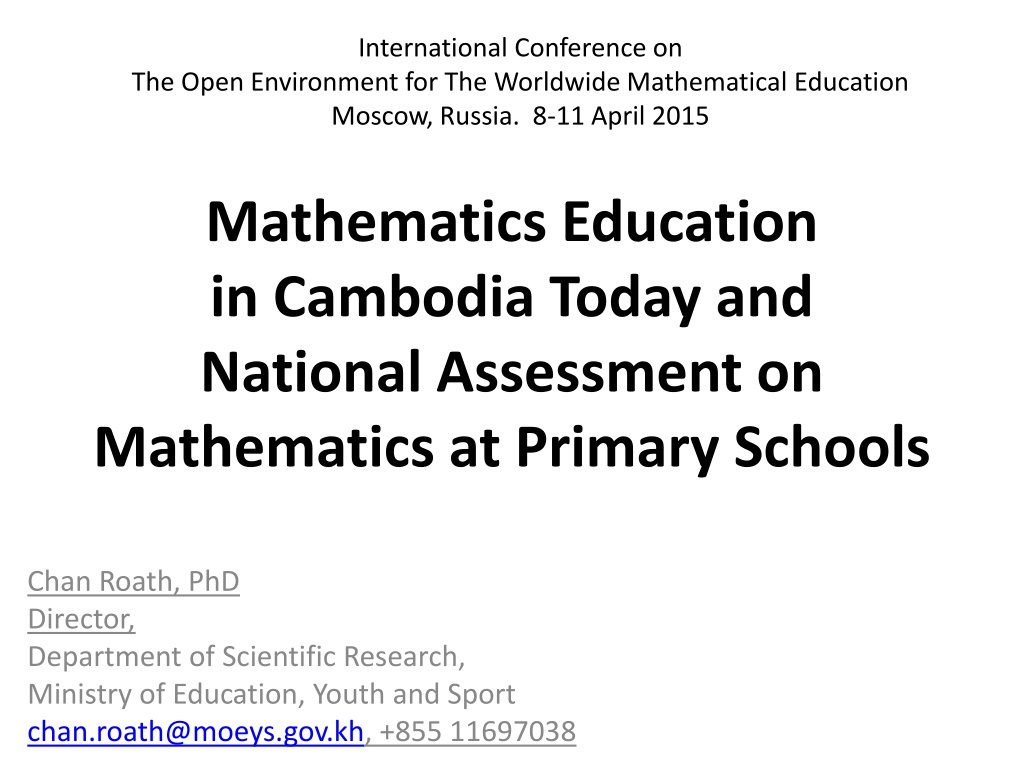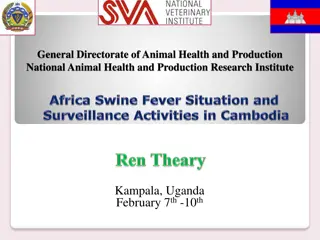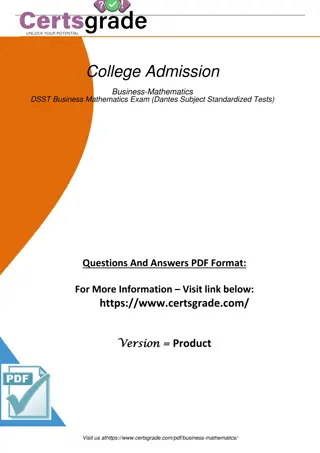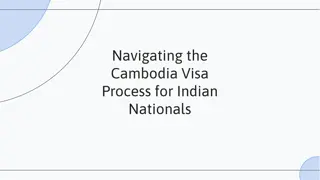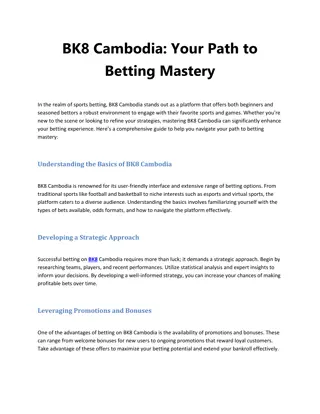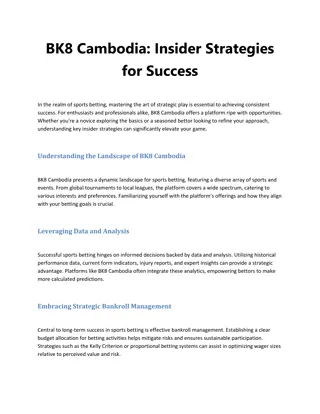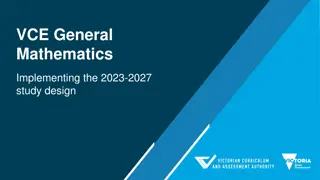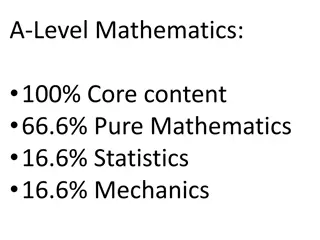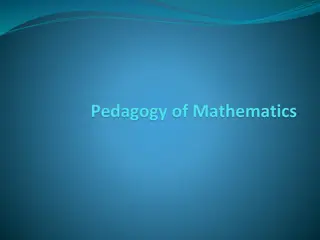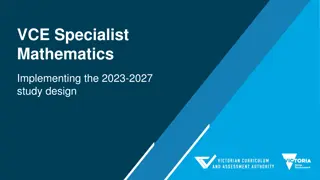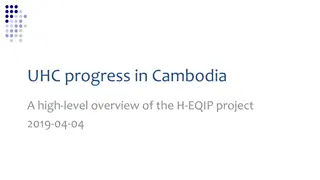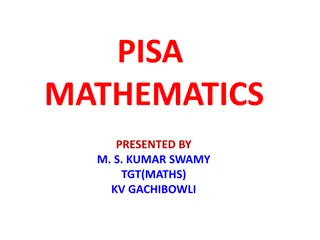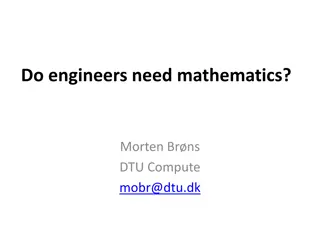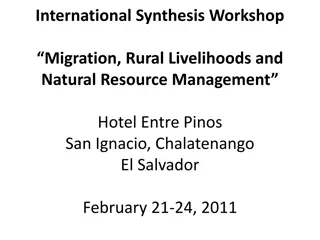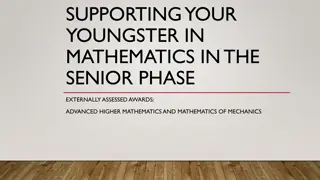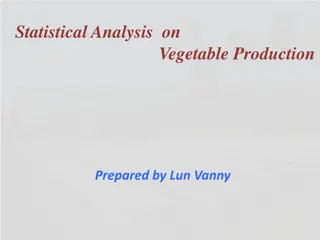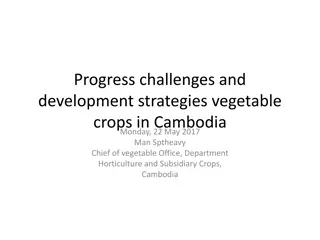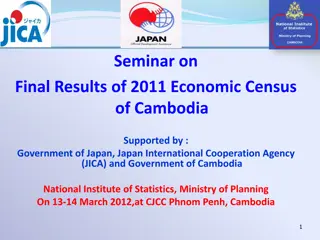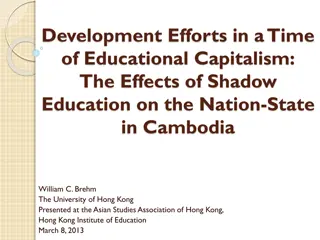Mathematics Education in Cambodia Today
The Kingdom of Cambodia, known for its rich scientific history, suffered educational setbacks during the Khmer Rouge regime. This article explores the current state of mathematics education in Cambodia, highlighting curriculum, textbooks, teachers, and national assessments. Rebuilding the educational system post-1979 has been crucial for the nation's development, with an emphasis on overcoming challenges such as teacher shortages and illiteracy among the youth.
Download Presentation

Please find below an Image/Link to download the presentation.
The content on the website is provided AS IS for your information and personal use only. It may not be sold, licensed, or shared on other websites without obtaining consent from the author. Download presentation by click this link. If you encounter any issues during the download, it is possible that the publisher has removed the file from their server.
E N D
Presentation Transcript
International Conference on The Open Environment for The Worldwide Mathematical Education Moscow, Russia. 8-11 April 2015 Mathematics Education in Cambodia Today and National Assessment on Mathematics at Primary Schools Chan Roath, PhD Director, Department of Scientific Research, Ministry of Education, Youth and Sport chan.roath@moeys.gov.kh, +855 11697038
Content I. II. III. Mathematics Education in Cambodia Today A. Mathematics Curriculum B. Mathematics Text Book C. Mathematics Teachers D. Mathematics Management IV. National Assessment on Mathematics Education A. Grade 3 on 2012 B. Grade 6 on 2013 C. Result V. Conclusion Introduction Current Education System in Cambodia
I. Introduction The Kingdom of Cambodia was one of the world leaders in technology and scientific understanding during the Khmer Empire from the ninth through the fifteenth century. The scientific understanding of our ancestors was among the most developed in the world at that time, and their scientific appreciation was profound.
During that time our intellectuals were among world leaders in their knowledge of mathematics, astronomy, other scientific pursuits, and their strong understanding of the natural world , enabling them to create some of the most advanced and sophisticated architectures on the planet. The complex temples and shrines in the Angkor region are recognized by international scholars as the world's largest pre-industrial city.
Unfortunately the Khmer Rouge regime destroyed the education system in Cambodia between 1975 and 1979. The process of rebuilding the educational system of Cambodia was started by collecting the surviving educated people and by adapting the slogan: The one who knows more teaches the one who knows less and the latter transfer s knowledge to illiterates .
Teachers ~1975 1975-1979 1979 Kampuchea Democratic University Instructors 725 50 Secondary School Teachers 2,300 207 Primary School Teachers 21,311 2,717 90% of all teachers were killed. More than 40% are illiteracy. Total People with age less than 14 years old lack of any basic education
II. Current Education System in Cambodia Curriculum Background 1980-1985: 4+3+3,one Stream(10subjects) 1986-1995: 5+3+3, one Stream(10subjects) 1996-2005: 6+3+3, one Stream(10subjects) 2006-2010: 6+3+3, selected subjects(7 or 8 subjects) Present :6+3+3, two Streams (Science or Social Science), 13 subjects in High School.
II. Current Education System in Cambodia Pre-school for 3 year(Level 1-3) Basic Education for 9 years(gr.1-9) Primary Education : 6 years from grade 1-6 Lower Secondary Education : 3 years from grade 7-9 Upper Secondary Education : 3 years from grade 10-12 Higher Education: - Bachelor Degree 4years(y1 - y4) - Master Degree 2 Years (y1-y2) - PhD Degree at least 3 years,
III. Mathematics Education in Cambodia Today A. Curriculum of Mathematics Primary Grades 1-3: to ensure that every child has a strong foundation in literacy and mathematics develop their health, physical appearance, Develop moral understanding and learning life skills. Khmer Mathematics Science & Social Studies (incl. Art Education1) Physical and Health Education LLSP 5 2 13 8 TOTAL 30h/Week 2
Primary Grades 4-6: to expand and consolidate students knowledge and understanding of the Khmer language, mathematics, learning skills, life skills and moral and personal development that will enable them to pursue life-long learning Introduce to content in Science and Social Studies Khmer Mathematics Science Social Studies Foreign Language Physical Health Education and Sport 2 LL SP Total 7 5 8 4 2 2 30h/w
Number of Lesson by Subject (grade7-10) Khmer Mathematics Sciences Chemistry Physics Biology Earth & Environmental Sciences Social Studies History Geography Home Economics Moral Civics1 Foreign Language Physical & Health Education and Sport 2 LLSP 1 2 2 1 1.5 1.5 1 2 6 6 6 6 4 Total 32h/w 2
B. Mathematics Textbook The text-books used in Cambodian schools are written by experienced local teachers. As previously mentioned these teachers do not have the same qualifications for this job as their international counterparts often have. Cambodian mathematical textbooks often suffer from the following problems: Text books often contained mathematical errors. The teachers with lesser experience did not recognize these mistakes and may teach incorrect mathematics to students. Text books may not reflect modern educational psychology and pedagogy.
Teachers guides are not widely available and there is a lack of reference books for teachers in Khmer as most teachers can only speak, read and write in Khmer. Text is printed only in black and white. There are no high quality color graphics usually available in international text books. There is little correlation between the mathematical teaching and its application to real life situations. Insufficiency of (new) textbooks, teachers guide, and other sources in Khmer, and lack of reference books for teachers.
Less visualization in the available textbooks, and weak linkage between the texts and the daily s lives. Limited capacity of textbook authors and editorial board members. Lack of expertise in curriculum development. Lack of information regarding the new trends of curriculum and textbooks within the regions and in the developed world. Higher Education curricula have not been well- informed to the students and for the education quality monitoring.
C. Mathematics Teachers Preschool Teacher : Grade 12+1 Training at the Preschool Teacher Training Center (1) Basic Education Teacher Primary Teacher : Grade 9+2 ,12+2 Training at Provincial Teachers Training Center (18) Lower secondary teacher: Grade 12+2 Training at Regional Teacher Training Center (6) Upper Secondary Teacher: Bachelor +1 Training at National Institute of Education (Only one)
D. Mathematics Management Mathematics management suffer from the following problems: 1. A lack of visions and educational leadership and management results from a lack of specialist knowledge in these fields. 2. Low contributions to education from communities and the private sector in Cambodia. 3. A lack of school networking development, experience sharing, and best practices.
IV. National Assessment on Mathematics Education Ministry of Education, Youth and Sport has commenced conducting National Assessment in 2012 for exclusively Grade 3. in 2013 for Grade 6. and with the participation from various departments: Primary Education Department, Curriculum Development Department, Inspectorate, and Quality Assurance Department with the total number of 56 persons. the first-ever
Goals of National Assessment The main goal of assessment on mathematics at primary schools is to provide feedback on five essential elements as follows: Learning process to inform students and teachers that are actively engaged in the assessment of the students progress as part of the development of their wider critical thinking and self-assessment skills;
Providing feedback on levels of students learning outcome , compared with curriculum standards and the whole national curriculums; Providing feedback on problems related to teaching techniques and learning processes; Providing data or information for policy makers to make decisions; and Providing data or information for studies and research.
Assessment Framework 1. Levels: Grade 3, Grade 6, and Grade 8 2. Cycle: Yearly but one grade every three year and one year per one grade. Ex. Grade 3 on 2012, grade 6 on 2013 and grade 8 on 2014. 3. Subjects: - For Grade 3, and Grade 6 : (1). Khmer Language, (2). Mathematics - For Grade 8: (1). Khmer Language, (2). Mathematics, (3). Science 4. Tools: Writing tests for students and questionnaires for students, teachers, and principles
Methodology: - Step 1: Determination of the detailed assessment plans - Step 2: Preparation of writing test papers - Step 3: Piloting the test papers - Step 4: Preparing final test papers - Step 5: Selecting sample schools - Step 6: Testing and completing questionnaires - Step 7: Data entry, data verification, and preparation of data bases - Step 8: Data analyses and report writing - Step 9: Dissemination of test results.
Assessment on Mathematics Education for Grade 3 in 2012 and Grade 6 in 2013: The assessment for grade 3 was conducted at 150 primary schools out of 6910 primary schools nationwide with the number of 30 students per school and 4500 students in total. The assessment for grade 6 was conducted at 210 primary schools among 6993 primary schools [8] across Cambodia with the total number of students 6300, in which there were 30 students per school.
Result of National Assessment on Mathematics Education on Grade 6 in 2013
3. Challenge While conducting the national assessment, the assessors have faced some challenges, such as: (1)Lacks of means of transportation from provincial towns to districts and districts to schools, (2) The knowledge of assessors who conduct the national assessment is limited, (3) Lacks of materials to support the assessment activities like computers.
V. Conclusion Cambodia passed and experienced the worst time and has gradually moved to the developing phases. Therefore, the strengthening of quality of education in general and in particular the quality of mathematics education has been considered as the priority. According to the results of the national assessment on mathematics education for Grade 3 (2012) and Grade 6 (2013),
V. Conclusion We found that quality of education, especially mathematics education in Cambodia is still limited. This requires us to pay more attention to teachers qualifications, curriculum development, and teaching methodology/ pedagogy, supporting materials for teaching, learning, researching, and so forth. To solve this problem we have established Cambodian Mathematical Society
V. Conclusion Desired outcomes of the goals of the Cambodian Mathematical Society include: Enhanced knowledge and expertise in mathematics education for Mathematics teachers at all levels within the system. Access to relevant learning materials, including texts in Khmer for all students, teachers and researchers.
V. Conclusion The mathematics curriculum will be relevant to the needs of students and communities, will be aligned with the most modern and internationally accepted science and technology, and will enjoy similar attention to other curriculum areas. There will be an enhanced interest in, and commitment to, mathematics education by students, researchers and potential mathematics teachers.
Reference [1]. Russell R. Ross, ed. "Education". Cambodia: A Country Study. Research completed December 1987. [2]. Constitution of Cambodia. Phnom Penh, 21 September 1993 [3]. Basic Education Curriculum Mathematics Grade 1-9, MOEYS, [4]. USAID in Cambodia. Education [5]. C.Y. Kim & M. Rouse (2011) Reviewing the role of teachers in achieving education for all in Cambodia, UNESCO, pg 6-7 [6]. http://en.wikipedia.org/wiki/Education_in_Cambodia [7]. Education Statistics & Indicators 2012-2013, EMIS Office, Department of Planning, Phnom Penh, February 2013 (Supported by UNICEF/Sida) [8]. Education Statistics & Indicators 2013-2014, EMIS Office, Department of Planning, Phnom Penh, February 2014 (Supported by UNICEF/Sida) [9]. National Assessment on Mathematics Education for Grade3(2012) Grade 6(2013)
Thank You Very Much ! Please, Questions?
